We talk a lot about protein, vitamins, and even stress when it comes to hair health.
But how often do we stop and ask: What about fats?
Because while some fats quietly support the structure, circulation, and hormonal signals that keep your hair growing — others are silently sabotaging everything your follicles need to thrive.
This isn’t just about what’s on your plate.
It’s about what’s making its way into your bloodstream, your scalp, and ultimately… your hair.
In this deep dive, we’ll uncover how fats — both good and bad — shape the health of your hair from the inside out.
And more importantly, how to tell the difference between those that feed your follicles and those that fuel hair loss.
🔬 The Science Behind Fats and Hair Growth
Your hair isn’t just made of keratin — it’s built on lipids.
From the cellular membranes that form the root structure to the sebaceous glands that lubricate your scalp, fats are everywhere in the hair-growth process. But not all fats act the same — and the difference can mean flourishing follicles or chronic thinning.
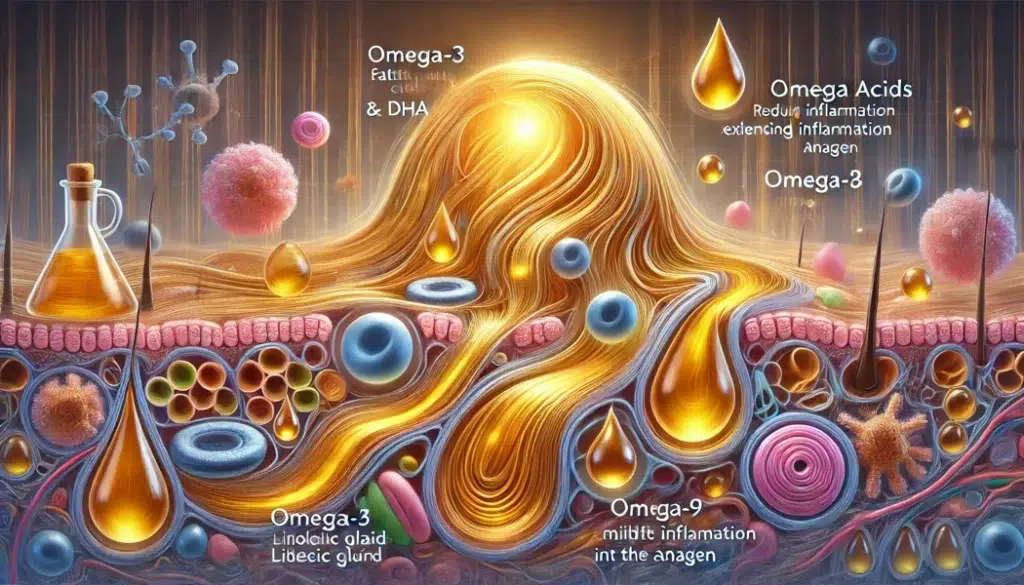
🔬 Omega-3 fatty acids, especially EPA and DHA, help reduce scalp inflammation and support healthy cell membranes around follicles. They also play a role in prolonging the anagen phase, the active growth stage of hair.
A 2021 review in Medical News Today and a 2025 publication in Nutrients both confirm that EPA and DHA help extend the anagen (growth) phase and significantly reduce scalp inflammation—especially when the omega‑3 to omega‑6 ratio is balanced properly.
Meanwhile, omega-6, like linoleic acid, is essential in small amounts but can trigger inflammatory responses when it dominates the diet — especially when not balanced with omega-3.
While linoleic acid (omega‑6) is essential in small amounts, multiple reviews (e.g. in Nutrients) demonstrate that when omega‑6 dominates the diet without a balanced omega‑3 intake, it leads to a pro-inflammatory state due to elevated production of arachidonic acid metabolites — a mechanism linked to increased scalp inflammation and follicular stress.
🧬 Then there’s omega-9, found in cold-pressed olive oil, which helps boost circulation in the scalp and improves the penetration of nutrients to the follicle base.
Oleic acid (omega‑9), predominantly found in cold‑pressed olive oil, acts as a proven skin penetration enhancer—improving diffusivity and partitioning across the skin and even promoting deeper follicular delivery of active compounds. Multiple studies show that monounsaturated fatty acids like oleic acid enhance dermal and follicular absorption better than polyunsaturated fats—making it a core ally for nutrient transport to the hair root. (ResearchGate review on topical fatty acids, Nutrients article on olive oil follicular targeting)
But perhaps most overlooked are the prostaglandins — lipid-based signaling compounds. Certain types (like PGF2α) have been shown to promote hair growth, while others (like PGD2) inhibit it.
Your body makes these compounds from the fats you eat — meaning your dietary choices directly shape which messages your follicles receive.
In short: the fats you consume don’t just become part of your body — they become part of your hair’s destiny.
🥑 Healthy Fats That Fuel Hair Regrowth
Not all fats are harmful — in fact, some are vital allies in the fight against hair loss.
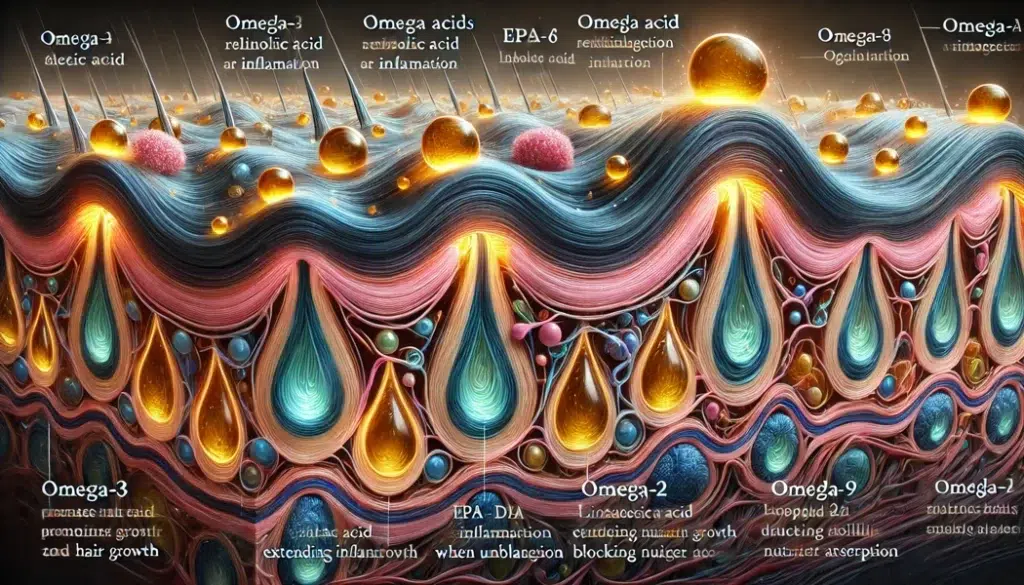
Let’s start with one of the most underrated nutritional tools for healthy hair: cold-pressed flaxseed oil.
Rich in ALA, a plant-based omega‑3 fatty acid, flaxseed oil reduces systemic inflammation and helps regulate hormonal imbalances that can lead to hair thinning — especially in women with conditions like PCOS.
📚 In fact, a 2021 study published in the Journal of Cosmetic Dermatology found that omega‑3 supplementation reduced hair loss by 30% in women with PCOS.
Another powerhouse is cold-pressed olive oil, known for its high content of oleic acid (omega‑9).
Unlike saturated or trans fats, oleic acid supports blood flow to the scalp, helping deliver nutrients deep into the follicle root. It also improves cell membrane fluidity — a crucial factor in nutrient absorption and follicular resilience.
Then there’s black seed oil (Nigella sativa), a centuries-old remedy now backed by modern research.
Its active compound, thymoquinone, has shown strong anti-inflammatory and DHT-blocking effects, helping to reduce miniaturization of hair follicles — one of the main mechanisms behind androgenetic alopecia.
Together, these healthy fats do more than feed your body — they create the biochemical environment your follicles need to grow stronger, longer, and healthier strands.
📝 We’re currently preparing a free Omega-3 Recipe Guide packed with anti-inflammatory, hair-supporting meals — designed to nourish your follicles from within. Stay tuned — it’s coming soon!
🚫 The Hidden Enemies: Bad Fats That Damage Your Scalp
If healthy fats nourish your follicles, bad fats slowly poison them.
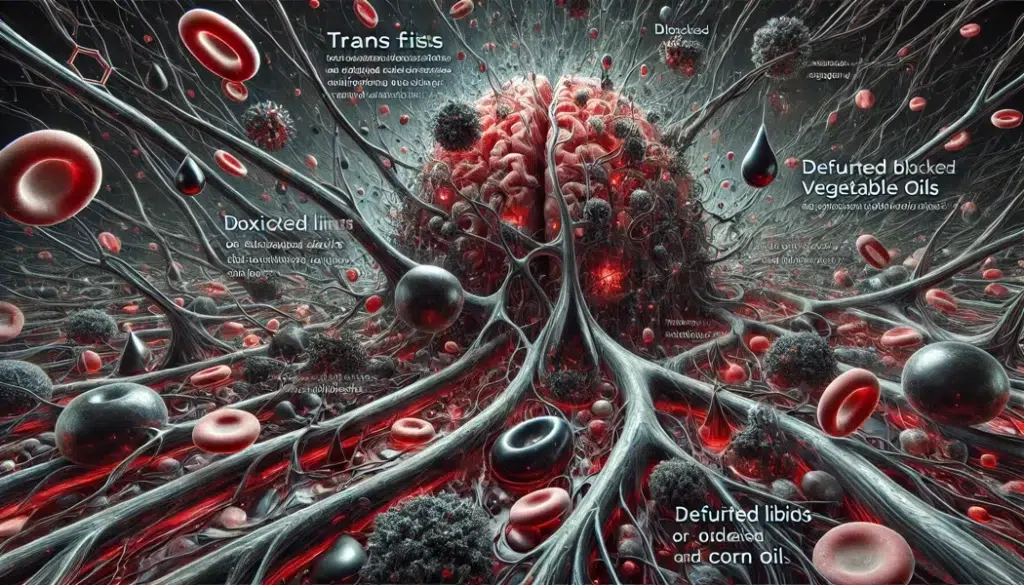
Let’s start with trans fats — artificially created fats found in margarine, fast food, packaged snacks, and baked goods.
They’re known to increase systemic inflammation, raise LDL cholesterol, and damage the delicate capillaries that supply blood to your scalp.
When circulation suffers, so does nutrient delivery to your follicles — and hair growth slows or stops altogether.
Then there’s the quiet threat of refined vegetable oils like soybean, sunflower, corn, and canola.
Heavily processed and often rich in omega-6 fatty acids, these oils disrupt the omega‑3 to omega‑6 balance, pushing the body into a pro-inflammatory state that undermines scalp health.
Even worse are reused or overheated cooking oils, common in fried street food and restaurant meals.
These fats contain oxidized lipids and toxic aldehydes that accelerate cellular aging and increase oxidative stress — a known factor in follicular miniaturization and telogen effluvium.
What’s most dangerous is that these fats don’t just affect your skin or weight — they alter the internal environment in which your hair either thrives or dies.
🧬 Animal Fats and the Hidden Hormonal Risk
Once a traditional staple, animal fats like pork lard and beef tallow are often romanticized as “natural” alternatives to processed oils.
But in today’s world, they come with baggage that wasn’t there generations ago.
Modern industrial farming often involves the use of growth hormones, antibiotics, and chemical feed additives — many of which accumulate in fat tissue, where they can linger long after slaughter.
When these residues make their way into your body, they don’t just disrupt gut health or immunity — they can directly influence your hormonal balance, triggering inflammatory responses that damage the scalp and weaken hair follicles.
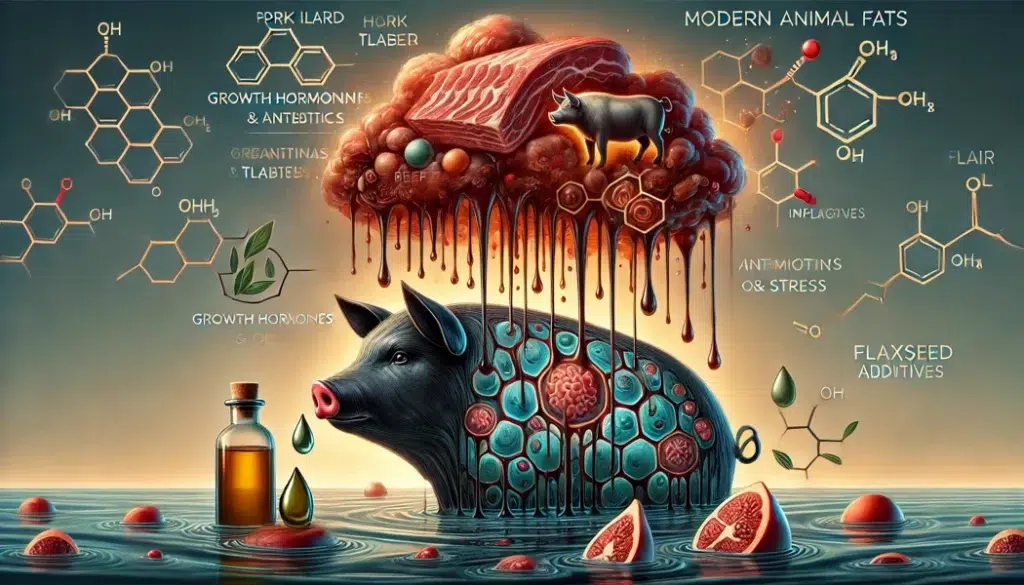
📌 Let’s be clear:
The problem isn’t fat itself — it’s the quality and origin.
Today’s animal fats are no longer the clean, nutrient-rich sources they once were. The same lard that grandma used to cook with is now a toxic sponge in many commercial products.
And even if you opt for organic or pasture-raised sources, the saturated fat load is still high — and its potential benefit is easily replaced by healthier plant-based oils like flaxseed, olive, or black seed.
When it comes to hair health, it’s not about nostalgia — it’s about choosing the fats that support your body’s biology, not fight against it.
⚠️ The Cortisol Connection: When Stress Meets Bad Fats
You might be eating “clean” — but if your stress levels are through the roof, your hair still suffers.
Cortisol, the primary stress hormone, isn’t just bad for your mood or your sleep.
Chronically elevated cortisol levels have been linked to:
- follicle inflammation,
- shortened anagen (growth) phase,
- and increased DHT sensitivity — a dangerous combo for hair health.
Now imagine pairing that internal firestorm with a diet full of pro-inflammatory fats like trans fats, overused vegetable oils, or toxin-laden animal fat.
What you get is a perfect storm of scalp sabotage — an inflamed, undernourished environment where follicles shrink and shut down.
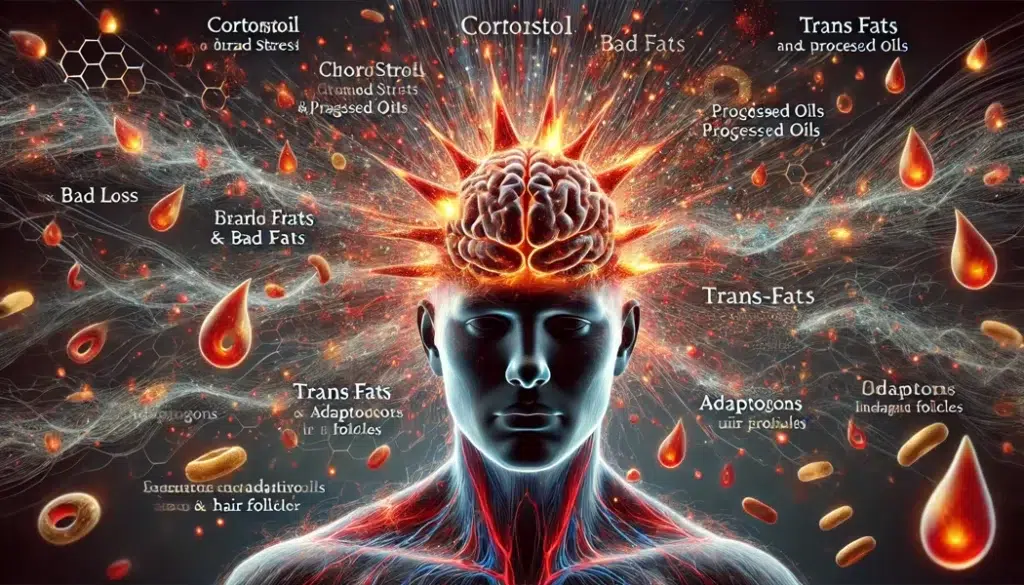
📌 What makes it worse?
Stress increases cravings for comfort foods — which often include fried, fatty, processed meals that only feed the fire.
But here’s the good news:
The same fats that damage your hair under stress can be replaced with ones that help your body recover.
Omega‑3-rich sources like flaxseed oil and cold-pressed olive oil have been shown to modulate cortisol levels, reduce inflammation, and restore follicular function over time.
Combine that with adaptogens like Rhodiola or ashwagandha, and you’re not just managing stress — you’re protecting your scalp from the inside out.
💡 Pro Tip: What the Other Blogs Don’t Tell You
Here’s something most articles about hair loss and fats never tell you:
🔬 Prostaglandins — lipid-based messengers made from the fats you eat — play a powerful role in regulating hair growth.
Some, like PGF2α, actively stimulate follicles, while others like PGD2 can inhibit growth and trigger miniaturization.
Your diet shapes the balance between these compounds.
→ More omega-3 = more “good” prostaglandins.
→ More trans fats = more “bad” ones.
🫒 Another insider tip? Omega-9 fatty acids, especially from cold-pressed olive oil, can enhance scalp circulation and improve nutrient absorption.
They don’t just nourish — they transport.
🧴 And if you’re using topical products?
Research suggests that oleic acid (omega-9) acts as a “penetration enhancer”, allowing key actives to go deeper into the skin — making your external routine more effective when paired with the right fats inside.
🧠 It’s not just what you eat — it’s how those fats talk to your body.
📋 What to Eat, What to Skip
Knowing the science is one thing — but turning it into daily choices is where real change begins.
Here’s a quick-reference guide to help you make scalp-friendly decisions the next time you’re filling your plate:
✅ Hair-Healthy Fats to Embrace:
| Fat Source | Benefit for Hair |
|---|---|
| Cold-pressed olive oil | Boosts circulation, omega‑9 rich |
| Flaxseed oil | High in ALA (omega‑3), anti-inflammatory |
| Black seed oil | Blocks DHT, calms scalp inflammation |
| Walnuts & chia seeds | Support hormonal balance |
| Fatty fish (sardines, salmon) | Rich in EPA & DHA (omega‑3) |
| Avocados | Nourish cell membranes, scalp hydration |
🚫 Fats to Limit or Avoid:
| Fat Source | Why It Harms Hair |
|---|---|
| Trans fats (margarine, snacks) | Increase inflammation, damage blood flow |
| Refined vegetable oils (canola, soy) | Disrupt omega balance, promote scalp stress |
| Deep-fried foods | Oxidized fats = follicle damage |
| Industrial animal fats | Hormone-loaded, pro-inflammatory |
🔭 The Future Is in Your Hands: Balance Over Blind Fixes
The science is evolving — no doubt about that.
But all the breakthroughs in the world mean little if your daily habits work against them.
🧪 Whether it’s omega-rich oils supporting cellular repair…
🧠 or cutting-edge molecules stimulating follicle activity…
None of it works in a vacuum.
Hair health is systemic.
It reflects the signals your body receives — through food, stress, hormones, and how you care for your scalp.
That’s why your next step doesn’t have to be radical.
It just has to be real.
Start by replacing the fats that fuel inflammation with those that fight it.
Support your body with nutrients that don’t just fill you up — they fuel growth.
Because when your internal environment supports healing,
even the most advanced treatments gain a fighting chance.
And your hair?
It doesn’t just survive — it begins to thrive.
Want healthier, stronger hair? Discover 8 science-backed habits that protect your scalp and boost natural growth. Get your free PDF guide today!
Want to know who’s behind all this research-backed, holistic hair guidance? Learn more about me here — and why I created HairGrowGenius to be a no-hype zone for real solutions.

❓ Frequently Asked Questions About Fats and Hair Health
🥑 Can eating healthy fats really improve hair growth?
Yes — especially fats rich in omega-3 and omega-9. They reduce inflammation, support hormonal balance, and improve blood flow to the scalp, all of which create a healthier environment for hair growth.
🧈 Are all animal fats bad for hair?
Not necessarily, but many modern animal fats (especially from industrial sources) contain residues of hormones and antibiotics, which may promote inflammation and disrupt hormone levels — both harmful for hair health.
🩺 What’s the link between inflammation and hair loss?
Chronic inflammation, often triggered by poor diet and high cortisol, can damage hair follicles, shorten the growth phase (anagen), and lead to excessive shedding.
🫒 What makes cold-pressed olive oil good for hair?
It’s rich in omega-9 and antioxidants, which boost circulation and reduce oxidative stress on the scalp. Always choose cold-pressed versions for the highest nutrient value.
💊 Do omega-3 supplements help with hormonal hair loss?
Yes. A 2021 study in the Journal of Cosmetic Dermatology showed that omega-3 supplements reduced hair loss by 30% in women with PCOS — a condition linked to hormonal imbalance and inflammation.

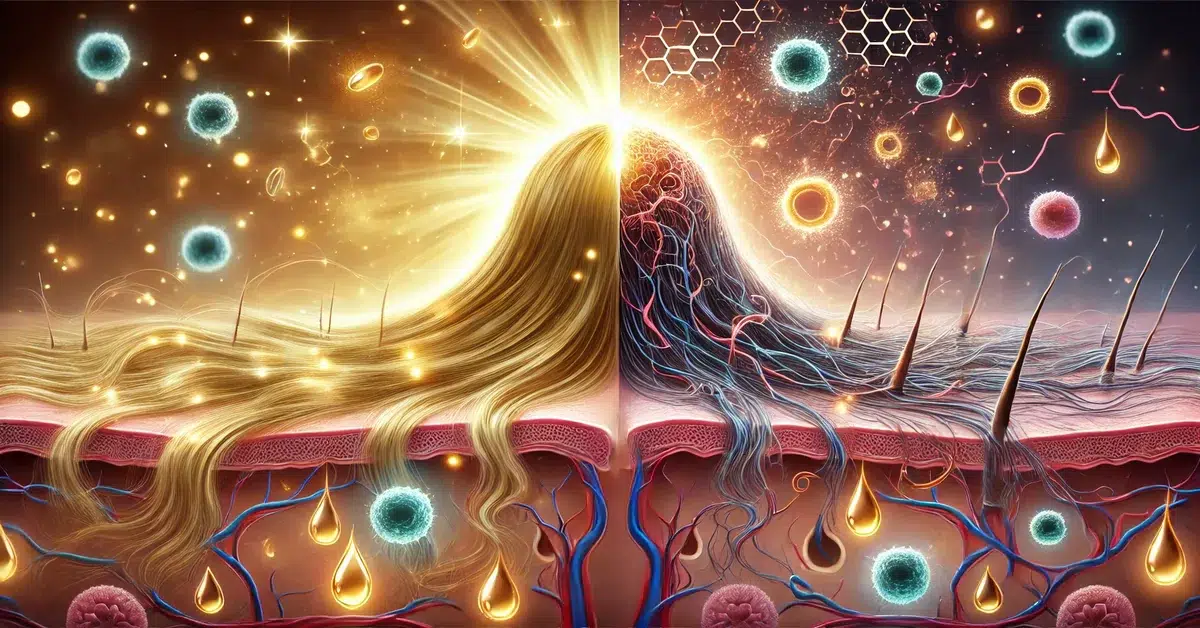
Leave a Reply